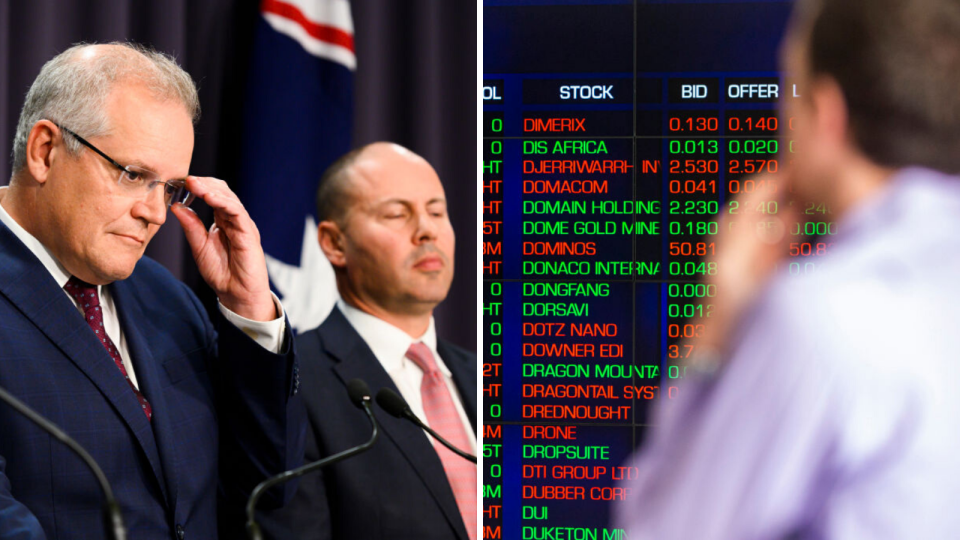Australia’s plan to rescue the economy: Too slow, too small

No one should blame the Morrison government for the coronavirus driven economic recession unfolding before our eyes.
It is an unforeseen health crisis that has seen large parts of the economy shut down, forcing hundreds of thousands of people to lose their jobs and businesses.
That said, the government will unambiguously carry the responsibility for how deep the recession is, and how long it lasts.
The speed and magnitude of the destruction of the economy demanded a quick and frankly huge reaction from policy makers.
More from The Kouk: 1 million unemployed: The possible effects of coronavirus on the economy
More from The Kouk: Will Australia fall into recession? It's in Scott Morrison's hands
More from The Kouk: ‘Rapid reverse’: Exactly how weak is the Australian economy?
How big is big?
The issue is about getting lots of money into the economy as rapidly as possible, helping people stay in their homes and helping businesses stay afloat.
Given the quite obvious magnitude of the shock to the economy, a massive policy effort is needed.
Wage subsidies, increases in social security payments, rent and mortgage relief, cash out the door for small and medium businesses, payment of utility bills for households are all just a part of what a strong economic policy reaction should be. These measures should have been easy to access, open to everyone even partly impacted and involve a lot of money.
Tragically, the government has shied away from such a policy response.
The policy roll-out to date being too slow and too small. Many measures are tied up in red tape – regulations making it hard for people to access payments.
Businesses are closing, workers have no work, retiree wealth has been destroyed as stock markets have crashed. And now, it looks like the housing sector will fall away, with house prices being crunched by mortgage defaults, unpaid rent and forced selling.
The images of people queuing outside Centrelink offices illustrate how sudden and severe the economic shock has already been.
Follow the leader – the experiences of other countries
Around the world, there have been an exciting mix of policy measures from other rich, industrialised countries. Wage subsidies and payments to workers and business, payments to ensure rent and mortgages are covered for individuals severely impacted in this crisis and relief on the payment of utilities are a few that will help the people impacted and the economy.
These are templates that Australia can follow. The hard work has been done.
To be sure, these are expensive for the government to implement. A strong response, a fulsome response would see budget deficits approach $150 billion per annum, perhaps more.
But just as no one queried the government in World War Two for spending too much money on guns, bullets or tanks, it is irrelevant how much money is needed now to stem the worst effects of the current recession.
In the current climate, if anyone is seriously worried about how much this will cost, their priorities are wrong. Money and lots of it is the critical element that will lessen the human and economic cost of this catastrophe.
It is enlightening to see the fiscal stimulus measures overseas.
In the UK, New Zealand, Canada, Germany and even the US, the stimulus measures are huge. They have been announced and in many cases delivered early.
They are generally well targeted, they get cash into the pockets of households and small and medium business, and are likely to cushion the downside to the recessions hitting each of these countries.
Measuring the success of economic policy
There are two simple benchmarks which the Morrison government’s fiscal measures will be benchmarked.
Those two items are:
The change in GDP;
The change in total employment.
and these should be measured relative to the US, Germany, the UK, Canada and New Zealand with the base period being the December quarter 2019.
As noted, no one will blame the Morrison government for the recession nor for the slump in employment, but it will be held account if it underperforms these other countries who it can be argued have delivered a more aggressive economic policy response.
If GDP and employment weakens and then recovers at a pace below these countries, the Morrison economic policy response will be a failure.
If GDP and employment weakens less and then recovers at a faster pace, Mr Morrison’s policy repose will have been a success.
It will take probably two years before we can pass judgment. When the virus has been beaten and economic conditions start to normalise.
Let’s hope the policies help Australia to outperform the world, just like it did during the global financial crisis.
The early signs are not encouraging.
Make your money work with Yahoo Finance’s daily newsletter. Sign up here and stay on top of the latest money, news and tech news.
Follow Yahoo Finance Australia on Facebook, Twitter, Instagram and LinkedIn.

